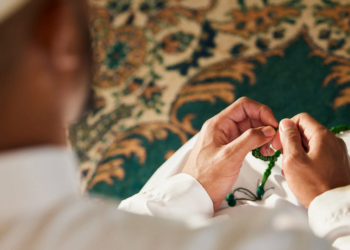No products in the cart.
Where Can I Find Prayers For Forgiveness
This post contains paid and/or affiliate links. I make a small commission at no extra cost to you. Please see our Privacy Policy.
When seeking prayers for forgiveness, individuals often turn to their respective faith traditions for guidance, solace, and reconciliation. People seek forgiveness for various reasons, whether from a higher power, others, or even from themselves.
It is a fundamental aspect of various religions and spiritual practices to acknowledge wrongdoing, ask for forgiveness, and strive to make amends.
The act of seeking forgiveness through prayer is a powerful way to address feelings of guilt, remorse, and regret, ultimately leading to inner peace and healing.
In Christianity, the Lord’s Prayer, also known as the “Our Father,” is one of the most well-known prayers that includes a plea for forgiveness: “Forgive us our trespasses, as we forgive those who trespass against us.” The Act of Contrition is a prayer commonly recited during confession, expressing sorrow for sins and asking for God’s forgiveness. Many churches also offer specific prayers dedicated to seeking forgiveness for particular transgressions or during specific religious observances.
In Islam, seeking forgiveness is a central tenet of the faith, and Muslims are encouraged to regularly ask for forgiveness from Allah through various prayers and supplications. The Istighfar prayer, which translates to “I seek forgiveness from Allah,” is a powerful invocation for seeking repentance and absolution from sins. Muslims also believe in the importance of seeking forgiveness from others they may have wronged to seek redemption and reconciliation.
In Judaism, the Yom Kippur holiday, also known as the Day of Atonement, is a significant time for seeking forgiveness and reconciliation with God and others. The Vidui prayer, a confessional prayer recited multiple times during Yom Kippur, provides a framework for acknowledging wrongdoing, expressing remorse, and asking for forgiveness. Jewish traditions also emphasize the importance of seeking forgiveness directly from those harmed to repair relationships and promote healing.
Other faith traditions, such as Buddhism, Hinduism, Sikhism, and more, also offer prayers, mantras, and rituals for seeking forgiveness, whether directed towards deities, spiritual figures, or one’s conscience. These prayers often focus on cultivating compassion, humility, and self-reflection, leading individuals toward renewal, growth, and spiritual awakening.
In times of distress, uncertainty, or inner turmoil, seeking forgiveness through prayer can offer a sense of peace, restoration, and hope. Whether recited in solitude, within a community of believers, or as part of a larger religious ceremony, prayers for forgiveness have the power to transform hearts, mend relationships, and bring about a sense of spiritual renewal and redemption.
The search for prayers for forgiveness is a deeply personal and profound journey that transcends individual beliefs, traditions, and cultures, reminding us of our shared humanity and capacity for forgiveness and grace.
The Importance of Seeking Forgiveness in Different Faith Traditions
Forgiveness is a fundamental concept in various faith traditions around the world. It is crucial in promoting harmony, inner peace, and spiritual growth. Different religions offer prayers and rituals emphasizing the significance of seeking forgiveness to cleanse the soul and restore one’s relationship with the divine. Let’s explore how forgiveness is viewed and practiced in some of the major faith traditions:
Christianity
In Christianity, seeking forgiveness is central to the teachings of Jesus Christ. Followers are encouraged to seek forgiveness through prayer, repentance, and asking for God’s mercy. The Lord’s Prayer, a well-known Christian prayer, includes the line “Forgive us our trespasses, as we forgive those who trespass against us,” highlighting the importance of both seeking and granting forgiveness.
Islam
In Islam, seeking forgiveness is deeply rooted in the concept of Tawbah, which means repentance. Muslims believe in seeking forgiveness from Allah through sincere repentance, prayer, and seeking to amend one’s ways. The act of seeking forgiveness, known as Istighfar, is mentioned in various prayers and supplications in the Islamic tradition.
Judaism
In Judaism, seeking forgiveness is a significant aspect of the High Holy Days, particularly Yom Kippur, the Day of Atonement. During this time, Jewish individuals engage in self-reflection, prayer, and seeking forgiveness from God and fellow human beings. The tradition of Teshuvah, or repentance, underscores the importance of acknowledging one’s mistakes and seeking forgiveness to make amends.
Buddhism
In Buddhism, forgiveness is viewed as a vital practice for releasing negative emotions and cultivating compassion. The concept of Metta, or loving-kindness, encourages individuals to extend forgiveness to others and themselves. Buddhists seek to let go of resentment and grudges through meditation and self-reflection, fostering inner peace and spiritual growth.
Seeking forgiveness in different faith traditions is a transformative practice that promotes reconciliation, humility, and inner healing. By embracing forgiveness and acknowledging one’s imperfections, individuals can embark on a journey towards spiritual renewal and emotional well-being, fostering a deeper connection with themselves, others, and the divine.
How to Find Prayers for Forgiveness
Seeking forgiveness is an essential aspect of spiritual growth and personal development. Forgiveness prayers in your daily spiritual practice can profoundly affect your emotional well-being and overall outlook on life. It is crucial to understand that forgiveness is about pardoning others and releasing yourself from the burden of holding onto negative emotions such as anger, resentment, and bitterness.
When looking for prayers for forgiveness, you can start by exploring traditional religious texts such as the Bible, the Quran, or the teachings of Buddha. These scriptures often contain powerful prayers and verses that emphasize the importance of forgiveness and offer guidance on how to seek and grant forgiveness. Many religious institutions also have specific prayers or rituals dedicated to forgiveness that you can incorporate into your daily spiritual routine.
In addition to traditional religious texts, many contemporary resources are available that offer prayers for forgiveness. Online platforms, such as websites, blogs, and social media pages, provide many prayers, affirmations, and meditations focused on forgiveness. You can also find books, podcasts, and apps dedicated to helping individuals cultivate forgiveness.
Furthermore, attending religious services, such as church services, synagogue gatherings, or meditation sessions, can allow you to engage in communal prayers for forgiveness. Being part of a supportive community that values forgiveness can enhance your practice and help you navigate the complexities of seeking and offering forgiveness daily.
It is essential to remember that forgiveness is a journey, and seeking guidance and support along the way is okay. Whether you turn to traditional religious texts, contemporary resources, or community gatherings, finding prayers for forgiveness that resonate with you can be a transformative experience. By incorporating these prayers into your daily spiritual practice, you can cultivate an open, compassionate heart free from the weight of unresolved conflicts and negativity.
The Transformative Power of Forgiveness in Personal Growth
Forgiveness is a profoundly transformative act that holds the power to shape personal growth in profound ways. We release ourselves from anger, resentment, and pain when we forgive. By letting go of negative emotions and grudges, we create space within ourselves for healing and growth to take root.
One of the key aspects of forgiveness is the freedom it brings. When we forgive others, we liberate ourselves from the emotional chains that bind us to the past. This liberation allows us to move forward with a lighter heart and a clearer mind. By releasing the weight of past grievances, we open ourselves up to new experiences and opportunities for self-discovery.
Moreover, forgiveness is an essential ingredient in the recipe for personal transformation. As we practice forgiveness, we cultivate empathy, compassion, and understanding. These qualities enhance our relationships with others and deepen our connection to ourselves. Through forgiveness, we learn to let go of ego-driven desires for revenge or retribution and, instead, embrace the path of love, kindness, and reconciliation.
Furthermore, forgiveness is a catalyst for inner peace and emotional well-being. When we forgive others, we release toxic emotions that can cause stress, anxiety, and even physical illness. By relinquishing the negative energy associated with holding onto grudges, we create space for peace, joy, and serenity to enter our lives. Forgiveness is like a soothing balm for the soul, offering comfort and solace in times of emotional turmoil.
In essence, forgiveness is not just a gift we give to others; it is a gift we give to ourselves. We take a giant leap toward personal growth and self-realization by choosing to forgive. We free ourselves from the shackles of the past and step into a brighter, more hopeful future. The transformative power of forgiveness knows no bounds, offering us the opportunity to heal, evolve, and flourish in ways we never thought possible.
Exploring the Healing Benefits of Forgiveness Prayers for Emotional Well-being
Forgiveness prayers are essential for seeking spiritual relief and hold profound benefits for emotional well-being. When we harbor resentment, anger, or hurt toward others, it can weigh heavily on our emotional state. Engaging in forgiveness prayers can be a transformative practice that leads to inner healing and emotional freedom.
One of the key benefits of forgiveness prayers for emotional well-being is the release of negative emotions. By consciously choosing to forgive those who wronged us, we let go of the burden of carrying grudges, anger, and resentment. This release can bring peace and lightness to our emotional state, allowing us to move forward with renewed clarity and positivity.
Moreover, forgiveness prayers can also promote healing from past emotional wounds. When we offer forgiveness to others, we also open the door to healing ourselves. Forgiving can be cathartic, helping us process and release pent-up emotions that may have been holding us back from experiencing true emotional well-being. This healing process can lead to increased self-awareness, self-compassion, and emotional resilience.
Additionally, forgiveness prayers can cultivate greater empathy and compassion towards others. As we extend forgiveness to those who have hurt us, we cultivate a sense of understanding and empathy for their actions and motivations. This shift in perspective allows us to release negative emotions and fosters a deeper sense of connection and compassion for humanity as a whole.
Furthermore, forgiveness prayers can enhance our overall emotional well-being by fostering a sense of gratitude and positivity. By focusing on forgiveness, we redirect our energy toward positive emotions such as love, compassion, and gratitude. This shift in mindset can uplift our spirits, increase our emotional resilience, and contribute to a more positive outlook on life.
Forgiveness prayers hold immense healing benefits for emotional well-being. By releasing negative emotions, promoting healing, cultivating empathy, and fostering gratitude, forgiveness prayers can transform our emotional state and pave the way for greater inner peace and well-being. Forgiveness prayers in our daily spiritual practice can nurture our emotional health, leading to a more fulfilling and emotionally balanced life.
Conclusion
Forgiveness is a universal concept that transcends cultural and religious boundaries. In various faith traditions, seeking forgiveness through prayers plays a crucial role in spiritual growth and emotional well-being. Different religious and spiritual practices offer guidance on where to find prayers for forgiveness, emphasizing the significance of acknowledging wrongdoing and seeking reconciliation with oneself, others, and a higher power.
In Christianity, prayers for forgiveness are often found in the Bible, such as the famous Lord’s Prayer, where believers ask for forgiveness as they forgive others. The sacrament of confession allows individuals to seek forgiveness directly from God through the guidance of a priest. By confessing and repenting sincerely, Christians believe they can experience the transformative power of forgiveness and receive God’s grace and mercy.
In Islam, seeking forgiveness is fundamental to daily prayers and supplications. The Quran provides numerous verses highlighting the importance of seeking forgiveness from Allah and turning away from sins. Muslims engage in dhikr (remembrance of Allah), seeking forgiveness through phrases like “Astaghfirullah” (I seek forgiveness from Allah) to purify their hearts and attain spiritual elevation.
Similarly, in Buddhism, forgiveness prayers are central to the practice of loving-kindness and compassion towards oneself and others. Forgiveness is intertwined with the understanding of karma and the liberation from suffering. By reciting mantras or engaging in metta meditation, practitioners cultivate forgiveness as a path to inner peace and enlightenment.
To incorporate forgiveness prayers into your daily spiritual practice, set aside quiet moments for reflection, meditation, or prayer. Choose prayers or affirmations that resonate with your beliefs and values, focusing on releasing resentment, seeking reconciliation, and fostering compassion. By making forgiveness conscious in your daily routines, you invite healing and transformation into your life.
The transformative power of forgiveness lies in its ability to release emotional burdens, heal past wounds, and foster inner peace. By letting go of grudges, resentment, and anger, individuals open themselves to personal growth, empathy, and connection with others. Forgiveness is not about condoning harmful actions but freeing oneself from negativity and embracing a path of healing and reconciliation.
Exploring the healing benefits of forgiveness prayers reveals their profound impact on emotional well-being. Research has shown that practicing forgiveness can reduce stress, anxiety, and depression while promoting feelings of compassion, gratitude, and forgiveness. Individuals cultivate emotional resilience, empathy, and positive relationships by engaging in forgiveness prayers regularly, leading to a healthier and more fulfilling life.
The journey of seeking forgiveness through prayers is a transformative and healing process that transcends barriers of faith and culture. By embracing forgiveness daily, individuals can experience spiritual growth, emotional well-being, and a profound sense of interconnectedness with themselves and their world.
May forgiveness guide us toward love, healing, and inner peace.













